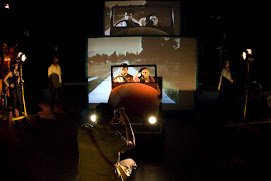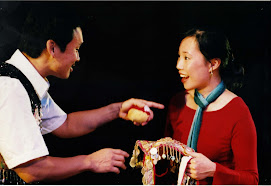With the publication of Lee Lewis’s Cross-racial Casting—Changing the Face of Australian Theatre, and an article about the issue in a recent Sydney Morning Herald, questions of representation are in the spotlight—again. This time the focus is on actors of non-European background, and their absence from main stages. Miss Saigon no doubt excepted. Anyway this flurry of interest got me thinking about representation more generally. An exchange in June in Theatre Notes, Back to regular programming … discussed this vexed issue in relation to gender. The dialogue sprang from an article in The Age about Joanna Murray-Smith, who had apparently written to the Sydney Theatre Company to ask why they weren’t programming her plays. Well, you've gotta admire her chutzpah ...
OK, here’s a view from Sydney on the STC: Yes, it certainly seems harder for a woman to get her foot in the door, even in the (relatively) small door of the variously-named Wharf 2 programs, where from Michael Gow in the early 1990s, to Brendan Cowell in 2007, the artistic directors have all been male. But why is the STC copping all the flack? Wasn’t it Belvoir Company B whose 2005 season included not a single female playwright or director? The perplexing thing there was that no one commented on this—at least not publicly. Does Company B’s strong record of supporting indigenous work buy them immunity from criticism on matters of gender?
Yes, women writers and directors are under-represented on our better-funded stages and over-represented in back rooms and pub basements. And many non-European performers struggle to get cast as anything other than gang members, refugees, and—for Asian actors—doctors. But I wonder how useful it is for us to keep chewing over this issue? Regurgitating essentially the same arguments? Plus ça change and all that. Perhaps in the words of Freedom, it’s time to ‘think outside the square’?
So here are a few thoughts:
· After a brief period in the spotlight, interest in inter-cultural work has waned. We still see overseas examples in festival programs, but for everyone here it seems it’s business as usual. Meaning artists from non-Anglo backgrounds get space to perform their own life-stories, but rarely a space to explore the questing, theatrically transformative agendas available to their White counterparts. (Why has interest in cross-cultural work declined? Would be interested to hear opinions about this … )
· It’s but a small step from representation to the heavy clay of identity politics, and escalating notions of ‘authenticity’. While I appreciate that autobiography and documentary are important genres in post-colonial societies, in that they are often the first places from which marginalised voices can speak and be heard … there’s a world beyond self-portraits.
· Is there really any point lobbying main-stage companies to represent our reality in anything other than a fairly tokenistic way, when they program for a conservative subscriber audience who, it seems, wants above all to see film and TV stars up close and personal? By all means send them your plays, and if they decide to produce them—fantastic. But if their door won’t budge, don’t waste too much energy trying to prise it open.
· Let’s remember that not all theatre writers and directors want to tailor their work and creative practices to fit main-stage imperatives. Sure, we’d like a share of their resources, but sometimes our artistic choices are better served in other contexts.
And finally—
Representation is too often posited as a destination rather than an ongoing process of engagement with the contemporary world. A destination reached through targeted initiatives and programs which can be rolled out like a carpet over any terrain, no matter how unsuitable or inhospitable. (I’m researching carpets at the moment, so they’re on my mind.)
Were these initiatives effective in the past? Maybe. To a degree. But the straight-talk about access and equality of opportunity that was once part of feminist, queer and post-colonial discourses of empowerment has given way as bureaucracies, universities and arts organisations have embraced the rhetoric. Today’s softer, more conciliatory calls for ‘representation’ have none of the rough edges of older demands for justice and transparency. So it should come as no surprise that what these well-meaning exercises produce is rarely any substantive or lasting engagement with diversity, but more often ‘representation-lite’.
12 August 2007
Subscribe to:
Post Comments (Atom)
+Photo+Leah+McGirr+3.jpg)




2 comments:
I am so glad that you now have a blog Noelle! Fantastic - and welcome to the dangerous dangerous world!
Hi Nicholas, Good to hear from you. I started blogging—in part anyway—to train myself to write faster! Not sure if I’m achieving that goal, but what-the-hell, I'm enjoying the journey, Noëlle
Post a Comment